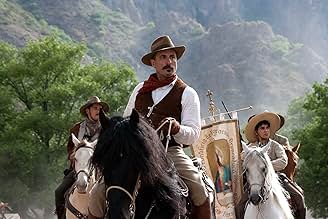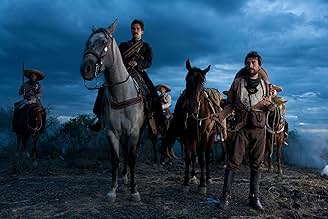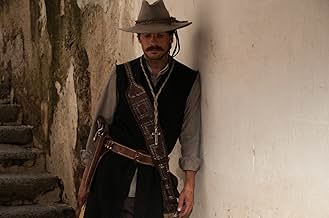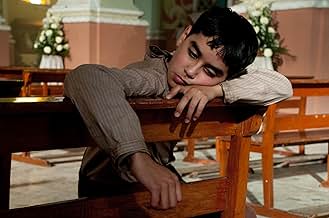PUNTUACIÓN EN IMDb
6,6/10
5,5 mil
TU PUNTUACIÓN
Una crónica de la Guerra de los Cristeros (1926-1929); una guerra desatada por el pueblo de México en contra del Gobierno mexicano ateo.Una crónica de la Guerra de los Cristeros (1926-1929); una guerra desatada por el pueblo de México en contra del Gobierno mexicano ateo.Una crónica de la Guerra de los Cristeros (1926-1929); una guerra desatada por el pueblo de México en contra del Gobierno mexicano ateo.
- Premios
- 3 premios y 9 nominaciones en total
Fernanda Urdapilleta
- Sandra Gorostieta
- (as María Fernanda Urdapilleta)
Reseñas destacadas
This is a movie about heroes who stood up for freedom – in this case, religious freedom. It's not easy to make a heroic film, but this movie comes reasonably close. There are a few awkward camera movements, and some of the younger actors don't always make the most convincing performances. However, the overall effort is quite moving and convincing. Considering these events actually happened and these are historical figures not fictional characters makes the movie that much more compelling. Some reviewers have argued that the movie is "too Catholic." Considering these were Catholics fighting, eventually, fighting violently, for their freedoms, these criticisms reveal more about the reviewers' prejudices and biases than it does about the film. This is an important, thought-provoking film about freedom that should be seen and discussed.
"We are now an army, we are an army fighting for Gad and for the church and for absolute freedom." A true story about the Cristeros War (1926-1929) which was a war by the people of Mexico against the atheistic Mexican government led by president Plutarco Elias Calles. Enrique Gorostieta Velarde (Garcia) leads a revolt of Mexican Christians against the government in hopes he can restore Mexico to the faith filled nation it once was. I will start by saying that this is a very good movie and entertaining to watch. I know nothing about the history or how accurate this is but I enjoyed it. The only problem that I had with the movie is that I really felt no connection to any of the characters and when one would get killed or have a serious problem I wasn't invested enough for it to have the impact that it was trying for. That said it doesn't really take away from the enjoyment of the movie but I didn't really feel the emotion that I think the filmmakers were trying for. Garcia is a great choice for this but he seems to play the character he played in "Godfather 3" or the Ocean's movies but a Mexican soldier version and he came off a little too cocky, but like I said I don't know the history and the real guy may have been that way too. It may seem like I'm rambling but the movie was over 2 hours long and it felt it and some parts I found it hard to stay focused on but overall this is a good watch and in my opinion one of the best releases this week. Overall, a good western/war movie that is pretty heavy on the religious issues. I give it a B+.
The film hijacks a complex social conflict and turns it into a David and Goliath story of good guys versus bad. In so doing, it whitewashes the historically reactionary role of the Catholic Church in Mexico. One cannot imagine how such an approach would convince or educate any viewer, including those not at all familiar with the history of this conflict. As befits a one-dimensional propaganda film, the performances are mostly flat and cartoonish.
It is ironic that a movie that purports to represent a popular struggle in defense of religion pointedly ignores the main protagonists: the peasants themselves, both as individuals and in their collective action. Throughout the movie, neither the peasant forces, nor the government soldiers that are sent against them are ever depicted as real human beings.
This movie's celebration of faith and charisma—reduced to the cry 'Long Live Christ the King!'—is a crude effort to obscure the underlying class conflicts that gave rise to the real Cristeros, a social movement that is not widely understood .... Victorious in the Mexican Revolution, the Constitutionalist Army, led by Venustiano Carranza, Álvaro Obregón and Calles, had defeated the peasant armies of Pancho Villa and Emiliano Zapata. The new regime was incapable of resolving a central issue over which the Revolution had been fought, the redistribution of land.
The slow and erratic pace of land distribution under Carranza, Obregón and Calles confirmed to the peasantry the military government's timidity in confronting the large and powerful landowners. The immense properties of the church constituted an important source of economic stagnation and social instability. Efforts in the 19th century to force the church to rent out its land to others, let alone to surrender ownership, met with fierce opposition.
According to historian Jesús Silva Herzog the peasantry and the working class confronted a "demonic triumvirate:" the great landowners, the military, and the Church. "Three tragic words define Mexican history: haciendas, sacristy and barracks." Lacking a revolutionary party and isolated from the workers, the rebellion of Mexican peasants was hobbled by the Catholic Church. Desperate peasant and Indians threw themselves into battle during the Cristero War ideologically imprisoned by Catholic dogma.
Had the Cristero War merely pitted the government of President Calles against the Catholic establishment, it is unlikely that the unprecedented brutality—the mass repression of peasants, the burning and looting of their towns—would have taken place. Historically, ruling classes reserve this kind of gross brutality to the rebellion of the most oppressed: peasants, workers or slaves.
It is ironic that a movie that purports to represent a popular struggle in defense of religion pointedly ignores the main protagonists: the peasants themselves, both as individuals and in their collective action. Throughout the movie, neither the peasant forces, nor the government soldiers that are sent against them are ever depicted as real human beings.
This movie's celebration of faith and charisma—reduced to the cry 'Long Live Christ the King!'—is a crude effort to obscure the underlying class conflicts that gave rise to the real Cristeros, a social movement that is not widely understood .... Victorious in the Mexican Revolution, the Constitutionalist Army, led by Venustiano Carranza, Álvaro Obregón and Calles, had defeated the peasant armies of Pancho Villa and Emiliano Zapata. The new regime was incapable of resolving a central issue over which the Revolution had been fought, the redistribution of land.
The slow and erratic pace of land distribution under Carranza, Obregón and Calles confirmed to the peasantry the military government's timidity in confronting the large and powerful landowners. The immense properties of the church constituted an important source of economic stagnation and social instability. Efforts in the 19th century to force the church to rent out its land to others, let alone to surrender ownership, met with fierce opposition.
According to historian Jesús Silva Herzog the peasantry and the working class confronted a "demonic triumvirate:" the great landowners, the military, and the Church. "Three tragic words define Mexican history: haciendas, sacristy and barracks." Lacking a revolutionary party and isolated from the workers, the rebellion of Mexican peasants was hobbled by the Catholic Church. Desperate peasant and Indians threw themselves into battle during the Cristero War ideologically imprisoned by Catholic dogma.
Had the Cristero War merely pitted the government of President Calles against the Catholic establishment, it is unlikely that the unprecedented brutality—the mass repression of peasants, the burning and looting of their towns—would have taken place. Historically, ruling classes reserve this kind of gross brutality to the rebellion of the most oppressed: peasants, workers or slaves.
An under the radar film about a subject I knew nothing about that absolutely floored me. It's a high quality film with flat out superb performances that makes you contemplate and appreciate faith and freedom like few films have ever managed to convey. Yes, it is a faith based film. If that offends some, then this isn't the movie or the subject for you. Unlike other faith based efforts, this effort is not cheesy or ham-fisted or even preachy.
It's the tale of the Cristeros War (1926-1929); a war by the people of Mexico against the Mexican government who cracked down in brutal ways against the Catholic Church and against religious freedom in general. Andy Garcia is Oscar level good here as General Gorostieta, a man with limited faith who responds and masterfully leads the fight for freedom. It's intense and, at times, surprisingly violent and impactful. This movie delivers real emotion and doesn't dodge tough questions about faith. It delivers an exceptional balance of showing why people behave and choose to engage in certain behaviors even when such behavior is contrary to the core of their belief system.
One thing is certain; no one who has faith will take it or their religious freedom for granted after watching and EXPERIENCING this film. That's how it registered with me at any rate.
It's the tale of the Cristeros War (1926-1929); a war by the people of Mexico against the Mexican government who cracked down in brutal ways against the Catholic Church and against religious freedom in general. Andy Garcia is Oscar level good here as General Gorostieta, a man with limited faith who responds and masterfully leads the fight for freedom. It's intense and, at times, surprisingly violent and impactful. This movie delivers real emotion and doesn't dodge tough questions about faith. It delivers an exceptional balance of showing why people behave and choose to engage in certain behaviors even when such behavior is contrary to the core of their belief system.
One thing is certain; no one who has faith will take it or their religious freedom for granted after watching and EXPERIENCING this film. That's how it registered with me at any rate.
This historical chapter plays close to home as my great-grandfather was morally involved and supported the resistance. He was a founder and active participant of the Knights of Columbus in Mexico City. This society played an active financial role in the rebellion. Our family business was also affected by this persecution in Mexico, as he could not sell his most important products, which at the time were altar candles for the churches. In the early years of this escalating situation, my great grandfather, a deeply religious man and friend of the church, hid at his candle factory, church artwork and religious valuables to keep them from being plundered and destroyed by government officials.
On more than one occasion, based on anonymous tips, government troops personally led by General Plutarco Elías Calles, raided both my great-grandfathers business and his home, looking for firearms and the illegal church valuables that he was hiding. Unable to find anything, the General made my great-grandfather kneel to the ground and shoved his pistol into the back of my great-grandfathers head. Why he never pulled the trigger or why they were never able to find anything either at the candle factory or at his home, was all God's work. At my great-grandfather's home, there were firearms in plain sight standing behind the open doors to the inner rooms supplied to him by the US Embassy in Mexico City.
This world is really-really small as fate would have it be, my brother-in-law married the great-granddaughter of General Plutarco Elías Calles Although my father knows about this, I never mentioned anything to my grandfather about the subject Thank God nothing more serious ever happened there are absolutely no ill-feelings between us, and it sure makes a heck-of-a-good family story for generations to come!
I hope you have an opportunity to see the movie, it is an important chapter of Mexican history which has been institutionally hidden for almost 100 years now.
On more than one occasion, based on anonymous tips, government troops personally led by General Plutarco Elías Calles, raided both my great-grandfathers business and his home, looking for firearms and the illegal church valuables that he was hiding. Unable to find anything, the General made my great-grandfather kneel to the ground and shoved his pistol into the back of my great-grandfathers head. Why he never pulled the trigger or why they were never able to find anything either at the candle factory or at his home, was all God's work. At my great-grandfather's home, there were firearms in plain sight standing behind the open doors to the inner rooms supplied to him by the US Embassy in Mexico City.
This world is really-really small as fate would have it be, my brother-in-law married the great-granddaughter of General Plutarco Elías Calles Although my father knows about this, I never mentioned anything to my grandfather about the subject Thank God nothing more serious ever happened there are absolutely no ill-feelings between us, and it sure makes a heck-of-a-good family story for generations to come!
I hope you have an opportunity to see the movie, it is an important chapter of Mexican history which has been institutionally hidden for almost 100 years now.
¿Sabías que...?
- CuriosidadesPartially financed by the Knights of Columbus, whose members in both the United States and Mexico were an integral part of the actual Cristeros Rebellion.
- PifiasJose gives up his white horse to another christero during a battle and hides in the rocks. When the other christero comes back to look for Jose, he is on a brown horse.
- Citas
Father Christopher: Who are you if you don't stand up for what you believe? There is no greater glory than to give your life for Christ.
- Créditos adicionalesNear the end of the credits, "Batman" is credited as a painter.
- ConexionesFeatured in The Secret Masonic Victory of World War Two (2022)
Selecciones populares
Inicia sesión para calificar y añadir a tu lista para recibir recomendaciones personalizadas
- How long is For Greater Glory: The True Story of Cristiada?Con tecnología de Alexa
Detalles
- Fecha de lanzamiento
- País de origen
- Sitio oficial
- Idiomas
- Títulos en diferentes países
- For Greater Glory
- Localizaciones del rodaje
- Empresas productoras
- Ver más compañías en los créditos en IMDbPro
Taquilla
- Presupuesto
- 12.000.000 US$ (estimación)
- Recaudación en Estados Unidos y Canadá
- 5.672.846 US$
- Fin de semana de estreno en EE. UU. y Canadá
- 1.885.608 US$
- 3 jun 2012
- Recaudación en todo el mundo
- 10.173.682 US$
- Duración2 horas 25 minutos
- Color
- Mezcla de sonido
- Relación de aspecto
- 2.35 : 1
Contribuir a esta página
Sugerir un cambio o añadir el contenido que falta





































